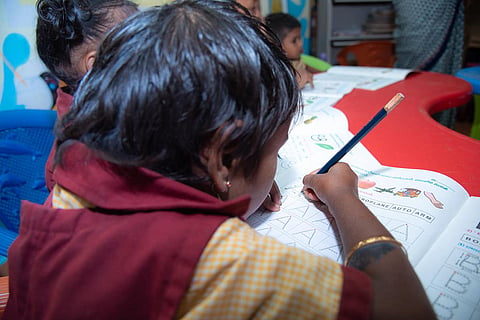

The Supreme Court, on Tuesday, issued a host of directions to states and Union Territories to cater to the educational needs of children in Child Care Institutions(CCI) and children who have been restored to their families during the COVID-19 pandemic. The bench passed the order while hearing a suo motu case on the condition of children in protection, juvenile and foster or kinship homes across India amid the coronavirus outbreak. The directions were issued based on the recommendations of advocate Gaurav Agrawal, who is assisting the apex court as an amicus curiae in the matter.
The bench, comprising Justices L Nageswara Rao, Hemant Gupta and Ajay Rastogi, was told that 2,27,518 children were in CCIs when the COVID-19 pandemic started and 1,45,788 have been restored with their families or guardians. Noting the importance and the need for providing education to those who have been restored with their families, the bench directed that District Child Protection Units (DCPU) to coordinate and oversee the progress made in the matter.
In this regard, the bench passed a slew of measures to ensure the education of such children.
> Provide Rs 2,000 a month for the education of each child who was in a child care institution (CCI) and now been restored to his or her family during the COVID-19 pandemic. This amount has to be given at the recommendation of the district child protection unit, keeping in mind the financial position of the children's families.
> State governments should provide necessary infrastructure, including books and stationery, to CCIs for the online classes of children living there on the basis of recommendation from DCPUs within 30 days.
> States should ensure that the required number of teachers are made available to teach children in CCIs.
> DCPUs must identify the number of children restored to families during the lockdown in a particular geographical locality and arrange a teacher for a group of 25 children.
> Such children should be given extra classes, if necessary, to help them prepare for final exams that will be held next year.
> Once every month, the DCPUs should apprise the District Legal Services Authorities about the progress in the functioning of the online classes and infrastructure at the CCIs.
> DCPUs, with the assistance of other statutory bodies, should assess children who have been restored to their parents/guardians/foster parents.
Incidentally, some of these directives are based on the practices followed in states like Telangana, Karnataka and Tripura in terms of providing education to children in CCIs, reported Live Law.
The Supreme Court had earlier issued directions to state governments and various other authorities to protect them. Accordingly, the National Commission for Protection of Child Rights (NCPCR) has issued directions to district administrations to restore children who have families and are residing at CCIs to their families or be considered for adoption or foster care. However, several child rights experts and organisations had said it was unwise.
However, on December 1, the SC said that children should be restored only after assessing and acertaining the fitness of parents/guardians as stipulated under Section 40(3) of the Juvenile Justice Act.
During the hearing conducted through video-conference, amicus curiae Gaurav Agrawal apprised the bench about the number of children residing in CCIs and restored with their families or guardians during this pandemic period. He said CCIs should be assisted by Juvenile Justice Boards (JJBs) and teachers should be provided for students by following COVID-19 guidelines.
“We want a direction from the Supreme Court that they should be provided educational facilities in children care homes,” Agrawal said, adding that state governments should make available necessary infrastructure and equipment for this. He said that teachers may be assigned to take stock of academic progress of children in CCIs in the last five months.
Solicitor General Tushar Mehta, appearing for the National Commission for Protection of Children Rights (NCPCR), said he has no objection to the suggestions given by the amicus.
Referring to a provision of the Juvenile Justice (Care and Protection of Children) Act, Tushar Mehta said, “We are making a mechanism to inspect the child care homes. We want a direction that states be asked to cooperate with the commission in inspecting the child care homes.”
The bench asked Mehta, “Why don't you do all these things such as monitoring the development of children and their welfare in child care homes? You can give the directions to the states on behalf of the commission. What do you want? Whether we should give the directions or you want to issue them?”
Tushar Mehta said directions from the apex court would carry weight and the commission would do the needful and ensure the implementation.
The bench observed that it is the duty of the child rights commission to ensure the implementation of law. “We will accept the suggestions of the amicus and will issue directions which have to be followed up scrupulously by the states in child care homes,” the bench observed, adding that the directions will have to be implemented through the states, NCPCR and state commissions.
(With input from PTI)
READ: